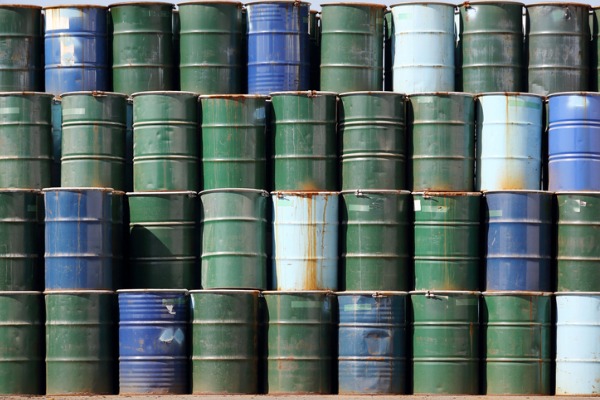How oil price boom could put global economy at risk
2nd March 2022 13:08
by Graeme Evans from interactive investor
The situation in energy markets is ‘very serious and demands our full attention,’ we’re told. Our City expert reports on the impact the oil boom could have on economies and interest rates.

A resilient showing by the FTSE 100 index today masked a deteriorating economic outlook after oil's sudden surge over $110 a barrel brought stagflation fears firmly into view.
Oil, gas and heating futures have all risen sharply this week, raising the chances that soaring inflation will put the brakes on consumer spending power and choke global growth.
These anxieties have been reflected in a flight to quality in the shape of the US dollar and to the bond market after the 10-year US Treasury yield fell to 1.71% from above 2% earlier this month. The latter move reflects expectations for six Federal Reserve rate hikes of quarter of a percentage point this year, compared with eight hikes priced only a couple of weeks ago.
For now, the London market's heavy focus on the commodity sector has helped the FTSE 100 to weather much of the geopolitical crisis caused by Russia's invasion of Ukraine. With Brent crude jumping to as high as $112 a barrel, shares in BP (LSE:BP.) and Shell (LSE:SHEL) rose by 5% today and the FTSE 100 lifted 0.9% to just above its starting point for the year at about 7,400.
- The funds, investment trusts and ETFs with exposure to Russia
- Why BP shares are going cheap
- BP’s $25bn decision to cut Rosneft ties
- Where to find income in 2022 as the mining boom ends
Oil prices are at another eight-year high, with the world seemingly powerless to stop the rise. Today's 7% increase came despite only the fourth-ever coordinated oil release from the International Energy Agency since its founding in 1974 – the others being the Gulf War in 1991, Hurricanes Rita and Katrina in 2005, and the Libyan civil war in 2011.
The release of 60 million barrels was supposed to send a strong message to global oil markets that there will be no shortfall in supplies as a result of Russia’s invasion. IEA members hold emergency stockpiles of 1.5 billion barrels, with yesterday's addition accounting for just 4% of this total.
The move comes at a time when inventories are at their lowest level since 2014 and Opec producers have struggled to provide additional supplies while they recover from Covid-19.
IEA executive director Fatih Birol said: “The situation in energy markets is very serious and demands our full attention. Global energy security is under threat, putting the world economy at risk during a fragile stage of the recovery.”
Russia accounts for around 11.5% of global oil output but is not yet the subject of sanctions from the West. However, the price of Russian oil tells a different story, given that it is trading at an unprecedented discount of $18.60 a barrel to Brent crude.
This is likely to reflect refineries and trading houses turning away Russian crude purchases for fear of future sanctions or because banks have refused to finance shipments.
- The financial impact of the Russia/Ukraine conflict
- Stockwatch: a defensive play for worrying times
- Ian Cowie: does this region offer investment trust bargains?
- Heavy selling across Europe highlights these safe haven stocks
UBS Global Wealth Management said it is evident that commodity markets are ill prepared, both from an inventory or from a spare capacity perspective, to handle additional supply disruptions linked to Russia and Ukraine.
It warns that if oil prices were to rise to $125 a barrel or higher for two quarters, it would result in roughly half a percentage point lower in global GDP growth. Despite these risks, it said a sustained spike in energy prices leading to recession is not currently the bank's base case.
UBS said: “We note that in most cases, geopolitical events including wars have a relatively short-lived impact on markets. If that proves to be the case in this instance, markets could quickly reprice.
“At this point, we maintain our year-end forecasts for US 10-year yields and our base case year-end forecast for the S&P 500 of 4,800.”
UBS recommends investors protect themselves by keeping a diversified portfolio and reduce volatility by considering defensive sectors such as global healthcare. It also backs using commodities as a geopolitical hedge, given the potential for further disruption.
The Swiss bank said: “We advise investors to consider hedges against the crisis, rather than exiting risk assets.”
As well as watching geopolitical developments, investors will be hoping the Federal Reserve and Bank of England are able to strike the right balance on interest rates.
Deutsche Bank analyst Jim Reid said today: “Central banks are going to have a real challenge on their hands as they seek to prevent supply-driven inflation becoming entrenched whilst also protecting growth.”
These articles are provided for information purposes only. Occasionally, an opinion about whether to buy or sell a specific investment may be provided by third parties. The content is not intended to be a personal recommendation to buy or sell any financial instrument or product, or to adopt any investment strategy as it is not provided based on an assessment of your investing knowledge and experience, your financial situation or your investment objectives. The value of your investments, and the income derived from them, may go down as well as up. You may not get back all the money that you invest. The investments referred to in this article may not be suitable for all investors, and if in doubt, an investor should seek advice from a qualified investment adviser.
Full performance can be found on the company or index summary page on the interactive investor website. Simply click on the company's or index name highlighted in the article.